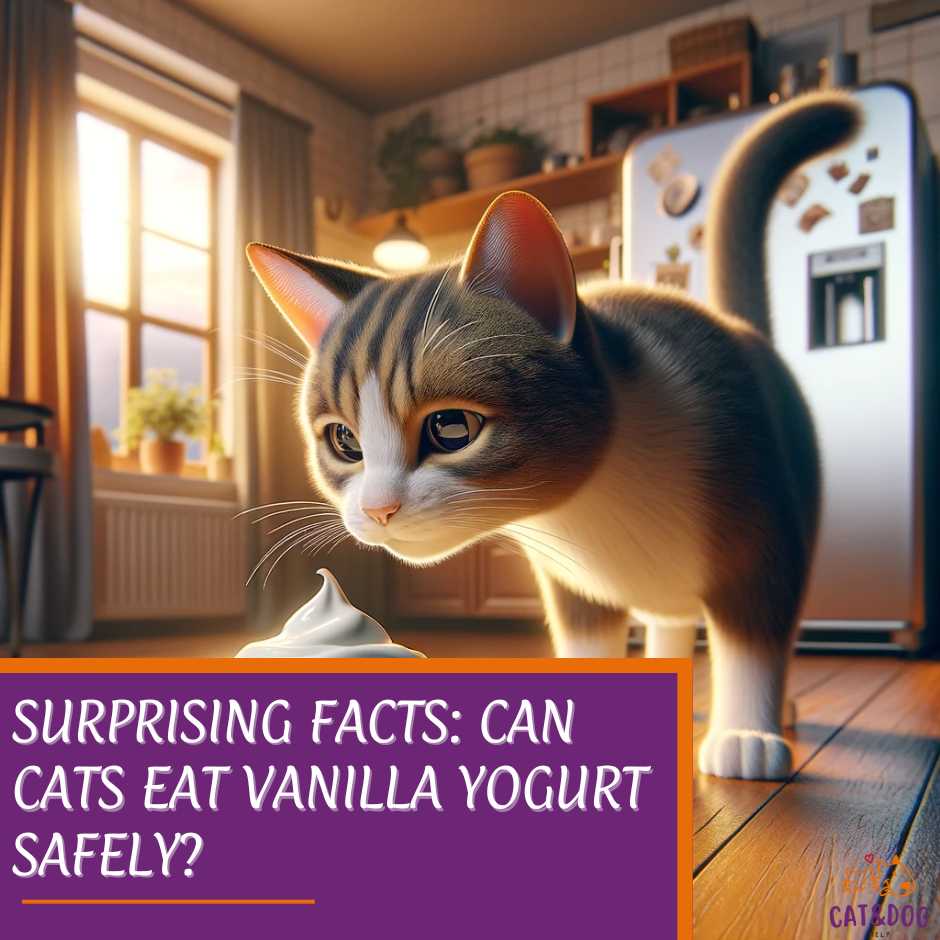Yogurt, as you probably know, has become a staple in many of our diets, famed for its creamy texture and touted for its health benefits.
But as we spoon through our favorite flavored varieties, it’s hard not to notice those little eyes watching us, silently pleading for a taste.
Now, vanilla yogurt might hit the sweet spot for us humans, but the question lingers: is it something our cat friends can enjoy too?
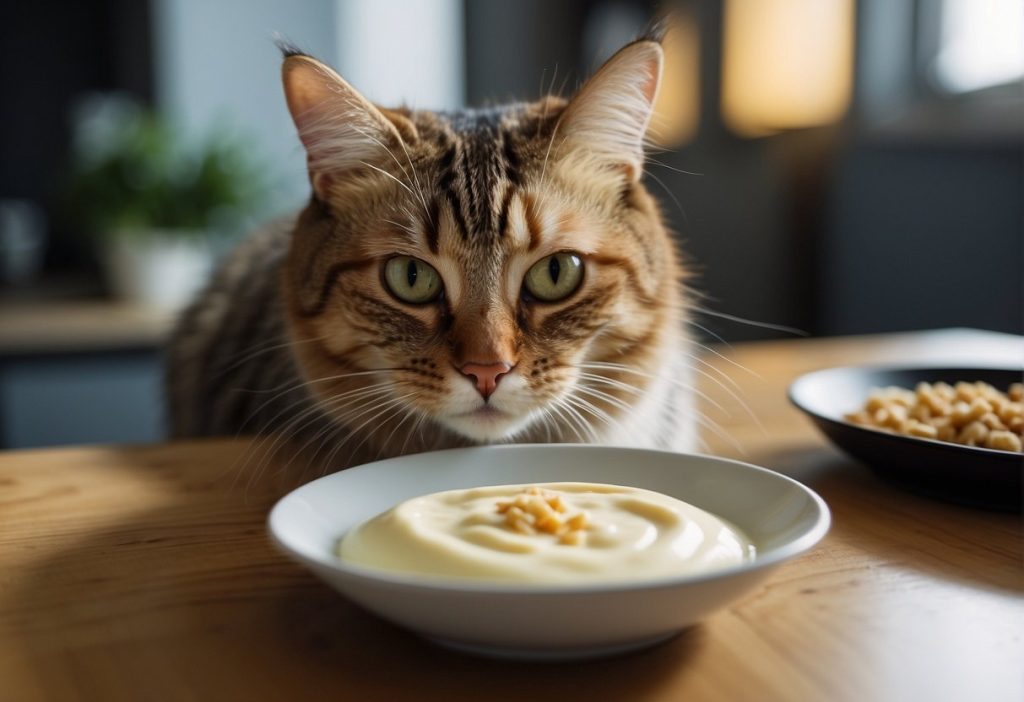
When we talk about vanilla-flavored yogurt, we’re creeping into a somewhat gray area for cats. Sure, they might find that sweet, aromatic flavor as tempting as we do, but does that mean they should indulge?
Your furry friend’s health is a top priority, and that’s exactly why we’re here, digging into expert sources and leaning on research to give you the scoop.
So, can cats eat vanilla yogurt?
Our goal? To unwrap the mystery surrounding cats and vanilla yogurt. So, let’s cut to the chase and get down to the facts that will help ensure you’re making informed choices for your feline’s snacking adventures.
Key Takeaways
- Vanilla yogurt is not toxic to cats, but its sugar content is a concern, so you need to know what harmful ingredients for cat to avoid.
- Plain, unsweetened yogurt can be beneficial in moderation.
- Consult your vet for personalized advice on feeding cats yogurt.
Understanding Feline Nutrition and Yogurt
Ever wondered what goes into keeping your purring pal healthy? Your cat’s diet is a complex world, just like our own.
Usually, there are always additional toppings when we consume yogurt which makes it tastier.
Now, you need to pay more attention to additional toppings such as pecans, berries, chocolate, or other toppings, because maybe these foods are not safe snacks for cats.
At the heart of it, cats are true carnivores. They thrive on a diet rich in proteins and fats, and they have a specific need for certain vitamins and minerals. (1)
These essential nutrients are like the ABCs for your cat’s health —non-negotiable!
Now, let’s talk dairy. While we humans might love a good dairy treat, it’s a whole different story for cats. Their bodies aren’t designed to handle dairy the same way ours can. (2)
So the big question is—is yogurt a go or a no-no for cats? Here’s the scoop:
- Probiotics: Yes, these are the good bacteria that can help with digestion.
- Calcium & Protein: On paper, they sound like a big win for bone and muscle health!
But, before you start spooning out your snack to share, remember that cats often have a lactose intolerance. It means that the lactose found in yogurt can sometimes lead to an upset stomach. And that’s not all.
Vanilla yogurt can come packed with sugars and fats not meant for your feline, potentially leading to obesity or diabetes.
Here’s a quick checklist for feline-friendly yogurt:
- Plain
- Unsweetened
- Given in moderation
So, keep your cat’s treats simple and well-suited to their tummy needs. After all, the last thing you want is a sick kitty on your hands!
When in doubt, a piece of safe fruit might just be the better option. Love your cat? Keep it lean, keep it clean—stick to the basics.
Specifics on Vanilla Yogurt for Cats
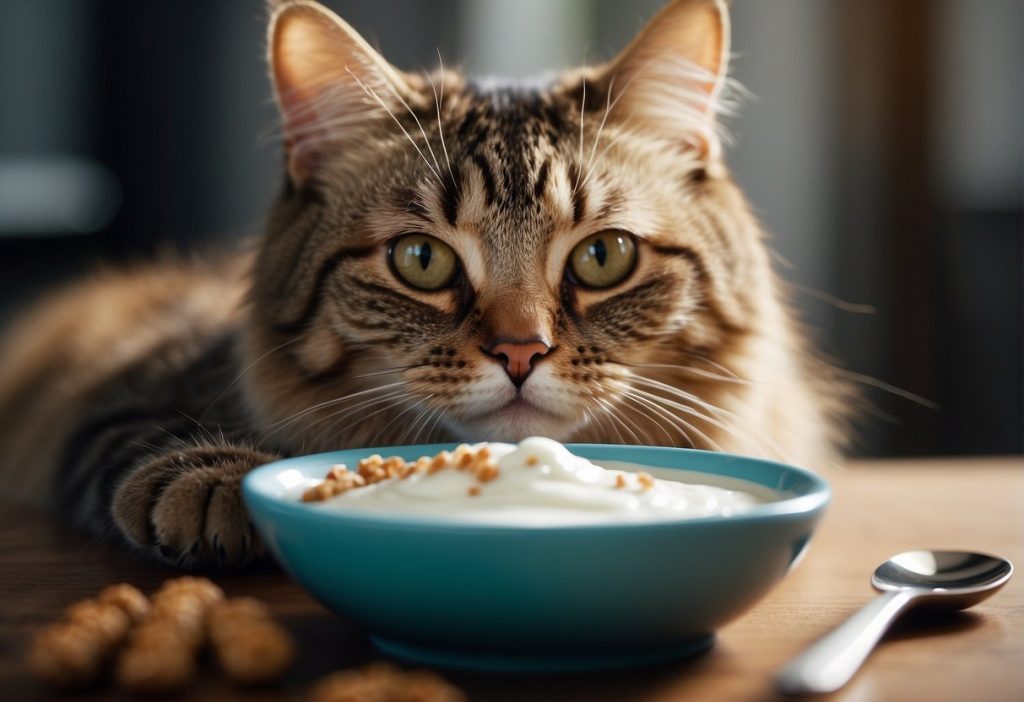
Vanilla Yogurt Ingredients and Cat Health Ever peered at the label on your vanilla yogurt and wondered if it’s a no-no for your purring pal? Let’s take a look at what’s inside that might not sit well with your kitty:
- Milk: Though it’s the base of most yogurts, many cats are lactose intolerant.
- Sugar: Great for your sweet tooth, but not so much for your cat’s waistline or blood sugar.
- Vanilla extract: Sounds harmless, right? Unfortunately, it often contains ethanol, which is a big no-no for feline friends.
- Preservatives: These are chemicals that keep yogurt shelf-stable, but could cause tummy troubles for your cat.
Cats plowing through a container of vanilla yogurt might face issues like obesity, a no-go for their nimble nature, and diabetes, which can complicate their nine lives. (3)
Plus, their delicate digestive systems may protest, leading to discomfort and upset stomachs. (4)
Comparing Plain and Vanilla Yogurt for Cats Curious about the nitty-gritty differences between plain and vanilla yogurt when it comes to your feline’s feast? Let’s break it down:
| Nutrient | Plain Yogurt | Vanilla Yogurt |
|---|---|---|
| Sugar Levels | Typically lower | Often higher due to added sugar |
| Additives | Minimal | Common, including artificial flavors |
| Lactose Content | Can be lower in specially formulated yogurts | Typically unchanged or possibly higher |
| Digestibility | Potentially easier on the tummy | Can be more challenging for cats to digest |
Boldly put, plain yogurt might be a safer bet if you’re considering a dairy dabbling for your kitty, thanks to lower sugar and less lactose – remember, moderation is key.
As for vanilla yogurt, the extra goodies mixed in for that tempting taste could leave your cat feeling less than perfect. Keep watch for any digestive drama if you treat them to a taste!
Can Cats Eat Vanilla Yogurt?
Have you ever found yourself spooning out a dollop of delicious vanilla yogurt and caught your feline friend eyeing it with curiosity? You might wonder if sharing a little treat with your cat is okay.
Let’s clear up some of the confusion about cats and vanilla yogurt.
The Truth About Vanilla Yogurt and Cats
Pros of Vanilla Yogurt for Cats:
- Contains probiotics: Beneficial for gut health.
- Calcium-rich: Good for maintaining healthy bones.
Cons of Vanilla Yogurt for Cats:
- Sugar content: Vanilla yogurt often has high sugar levels, not ideal for cats.
- Lactose intolerance: Many cats can’t digest lactose properly.
- Artificial additives: Some vanilla yogurts have flavorings that may harm cats.
No specific studies focus squarely on cats and vanilla yogurt, but experts suggest caution due to the potential drawbacks.
Lactose Tolerance in Cats (5)
Surprisingly, a significant number of adult cats – around 65% – are lactose intolerant. This means their digestive systems can’t handle dairy. Yogurt is fermented, so it has less lactose than milk.
That’s good news, right? Well, yes and no. While fermentation reduces lactose levels, making yogurt easier to digest, the remaining amount can still upset sensitive kitty tummies.
So, if you decide to let your cat try a bit of your vanilla yogurt, here’s what to remember:
- Introduce it slowly: Start with a small lick.
- Watch for reactions: Any signs of digestive upset? Scrap the idea.
- Plain is better: Skip the vanilla and opt for plain, unsweetened yogurt if you must.
In a nutshell, your cat may be able to enjoy a tiny taste of vanilla yogurt.
However, it’s crucial to monitor their response and know that plain, unsweetened yogurt is a safer bet if your cat is not lactose intolerant. (6)
Remember, moderation is key, and your cat’s primary diet should be nutritionally complete cat food.
Safe Feeding Practices for Cats
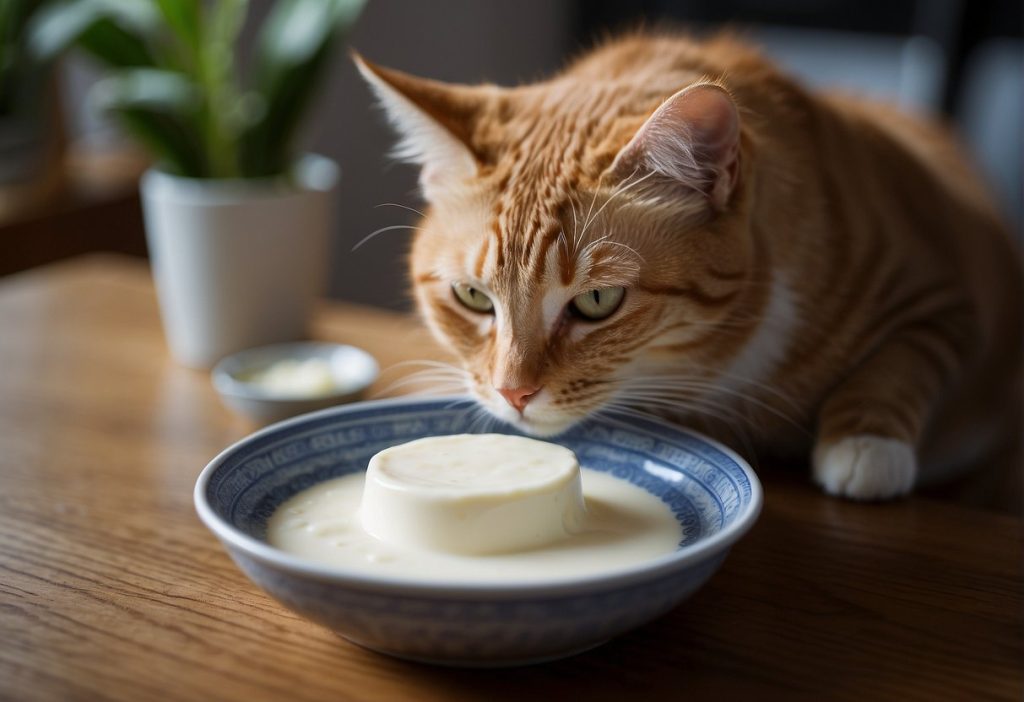
Have you ever wondered about treating your furry friend to something different? How about yogurt? Moderation is key when it comes to feeding your cat yogurt. Let’s break it down, shall we?
- Serving Size: A teaspoon of yogurt is a safe bet for an occasional treat.
- Frequency: Think of yogurt as a treat, not a staple. Offer it no more than once a week.
Now, why not vanilla yogurt? The simple answer: too much sugar and potential additives that aren’t cat-friendly. Cats can’t process large amounts of sugar well, and this can lead to health issues, it is better to avoid sweet treats to cat.
Alternatives to Vanilla Yogurt
Your cat’s wellness is important, and treats should contribute to their health, not compromise it. Here’s what you can offer instead of vanilla yogurt:
- Plain, Unsweetened Yogurt: Still has the creamy texture cats may love, minus the sugar.
- Specially Formulated Cat Treats: These are made with your cat’s nutritional needs in mind.
What’s the win-win with these alternatives?
- Calcium: Strengthens their bones and teeth, just like it does for us—sans the sugar crash.
- Probiotics: Good for their tiny tummies and can aid in digestive health.
But hey, let’s not get too creative with the dairy. Cats don’t need it, and some are lactose intolerant. Stick to plain yogurt, and even then, keep it sparse.
Remember, those regular cat meals are what truly keep Whiskers purring healthily.
Got it? Great! Now go enjoy some bonding over a healthy snack – sparingly, of course. Your kitty will thank you for the indulgence without the sugar rush!
Expert Opinions and Veterinary Advice
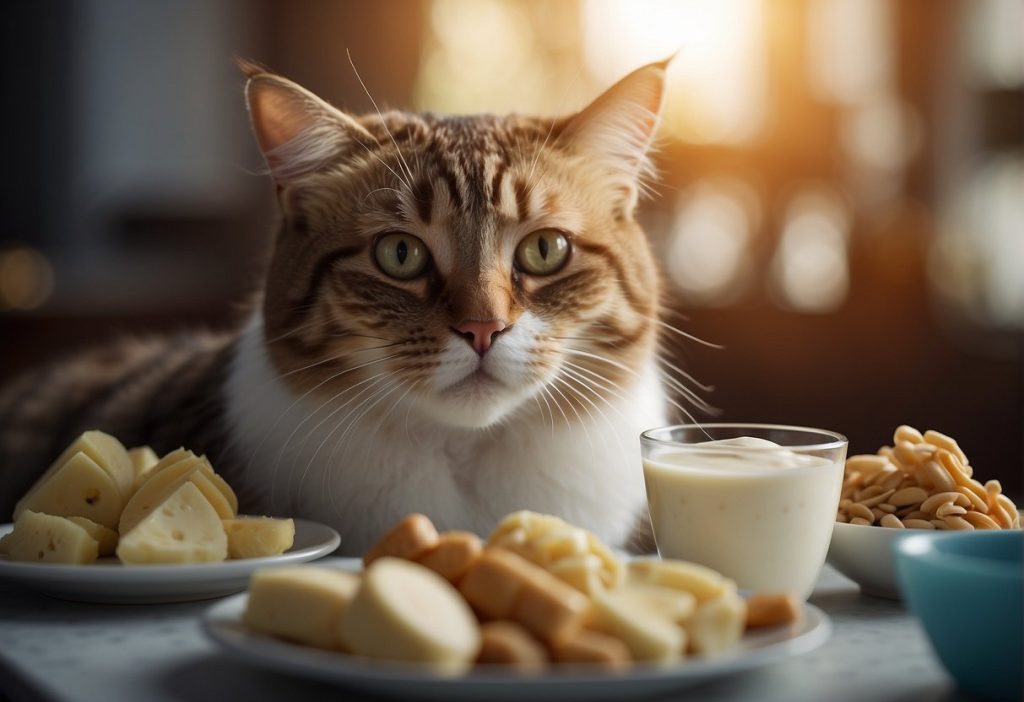
Have you ever caught your feline friend eyeing your vanilla yogurt? You might wonder if it’s safe to share a spoonful. Here’s what the pros have to say!
Veterinarian Insights on Vanilla Yogurt Dr. Amanda Charles, with her extensive veterinary experience, suggests that while yogurt can be a source of protein and probiotics, vanilla yogurt is not recommended for cats.
Why? Vanilla can be toxic, and the added sugars in flavored yogurt could lead to obesity or diabetes.
- Nutrient Consideration: Plain yogurt contains calcium and magnesium, beneficial for bone health.
- Lactose Concerns: Many cats are lactose intolerant, so even plain yogurt should be given sparingly.
Clinical Studies Research has yet to provide extensive clinical case studies regarding cats and flavored yogurts specifically. But consensus says lactose intolerance in cats is reason enough to be cautious.
Safety Tips
- Plain is Preferable: Opt for plain, unsweetened yogurt if you decide to treat your cat.
- Avoid Flavorings: Vanilla and other flavorings could harm your furry pal.
- Moderation is Key: A lick or two is fine, but don’t go overboard.
Remember, you know your cat best! Keep an eye out for any adverse reactions and when in doubt, skip the dairy aisle for kitty treats and stick to the pet store.
Quick Recap
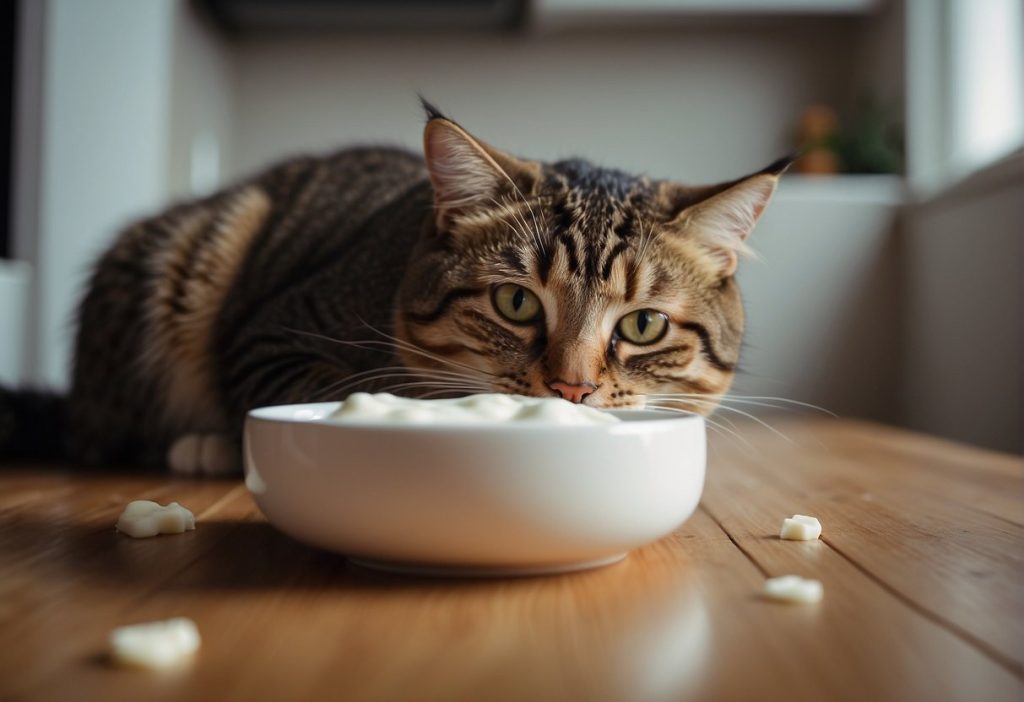
Have you been wondering about sharing your creamy vanilla yogurt with your furry friend? Let’s break down the do’s and dont’s:
Can Cats Eat Vanilla Yogurt?
- Not toxic: Vanilla itself isn’t toxic to cats.
- Ingredients matter: Watch out for artificial vanilla flavorings containing ethanol – a big no-no for your kitty.
Potential Benefits
- Probiotics: Live bacteria cultures in yogurt can aid your cat’s digestion.
- Taste Treat: Some cats may enjoy the flavor as a novelty.
Risks to Consider
- Sugar Content: High sugar can lead to obesity and diabetes in cats.
- Lactose Intolerance: Despite fermentation reducing lactose, some cats might still get tummy troubles.
Best Practices for Feeding Yogurt to Cats
- Moderation is key: A small amount can be a treat; keep it occasional.
- Observe: After a yogurt treat, watch for any signs of digestive upset.
- Professional Advice: When in doubt, a quick chat with your vet ensures your feline’s health is on track.
Remember, while a lick of plain yogurt can be a harmless treat, it should never substitute for a balanced cat diet. And always, check with a veterinarian if your cat has a history of digestive issues.
Keep your cat’s treats varied and their curiosity for new flavors satisfied – but make health a priority!
Frequently Asked Questions
Curious about treating your cat to some vanilla yogurt? Let’s dive into the tasty details that will help you pamper your feline the right way!
Is it safe for my kitty to indulge in some vanilla yogurt as a treat?
Yes, your kitty can enjoy vanilla yogurt as a treat. However, it’s important to watch for digestive upset, as not all cats tolerate dairy well.
What are the best types of yogurt to consider for my feline friend?
The safest choice for your feline is plain, unsweetened yogurt. It’s packed with calcium and probiotics that can benefit your cat’s health.
Can I share my fruit-flavored yogurt with my cat, or should I stick to plain?
Stick to plain yogurt for your cat. Fruit-flavored variants often contain added sugars and artificial sweeteners, which are not recommended for felines.
Could giving my cat yogurt that contains honey lead to any health issues?
While honey isn’t toxic to cats, it is high in sugar. Your cat’s best bet is yogurt without any added sweeteners like honey.
How often can I give my cat vanilla yogurt?
Vanilla yogurt should be an occasional treat, not a regular part of your cat’s diet. Moderation is key.
Are there specific guidelines I should follow when giving my cat vanilla yogurt regularly?
If you choose to give your cat vanilla yogurt regularly, do so in very small amounts, and ensure it’s a complement to a nutritionally complete diet.
Can cats have a reaction to artificial vanilla flavoring in yogurt?
Some cats may be sensitive to artificial flavorings. To play it safe, it’s best to offer plain yogurt without artificial vanilla flavoring.

